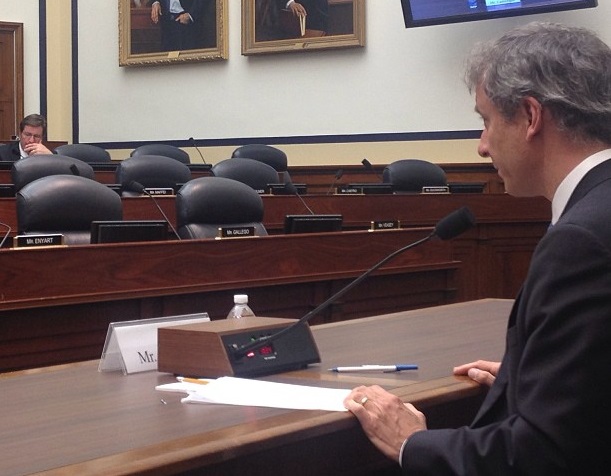Press Releases
Cartwright Fights for Tobyhanna Army Depot in Testimony Before the Armed Services Committee
Washington, DC,
May 9, 2013
Today U.S. Rep. Matt Cartwright testified before the House Committee on Armed Services. Below is video and text of Cartwright’s comments. "Members of the House Armed Services Committee, I come before you today to testify about the importance of our defense industrial base, and, specifically, about military depots. Right now, we stand at the tail end of two long wars that have stretched our budgets and severely strained our all-volunteer force. As the committee is aware, hard choices about defense spending will have to be made in the near future. In order to shrink our defense budget to fit a peacetime force, this committee will have to identify programs that are no longer vital to American safety, while, at the same time, maintain funding for readiness for a myriad of continuing threats. I hope you will join me in supporting replacing the sequester-level cuts with a defense budget policy that thoughtfully and appropriately reshapes our fighting forces. Our military depots are a fiscally prudent tool in maintaining readiness. As you set their budget, I urge you to consider the value of depots to the warfighter, the return on the investment that the American taxpayer receives from depots, and the indispensable economic role these facilities play in communities where they are located. In my district alone, Tobyhanna Army Depot, the army’s only C4ISR depot, generates $1.68 in economic activity for every dollar invested. Additionally, every job at Tobyhanna generates two and half jobs in the larger local community. Letterkenny Army Depot, also in my state, generates over one and half local jobs for every employee who goes to work for the base. In many cases, as with Tobyhanna, depots are the largest employers in their respective congressional districts. Dramatic reductions would economically devastate these communities. I would further ask you to consider the impacts sequestration and the FY 2013 Continuing Resolution have already had on Tobyhanna. Five hundred people have lost their jobs. Projected funding is about $100 million below what was originally planned, and funding actually received by the depot is now only about 72% of the revised, scaled-back plan. Work stoppages on several key systems will begin occurring next month. To maintain cost competitiveness, the depot has curtailed contracts and cancelled its capital investment program for this fiscal year. As the ability of depots to refurbish essential supplies becomes lost because of such cuts, the outlook for better integrating our forces through upgraded communications networks and equipment becomes bleaker. This is simply unacceptable. As Army Chief of Staff General Raymond T. Odierno stated last August: network upgrades remain the Army’s “number one modernization priority.” Last year, the House voted to cut nearly $2 billion from our military depot budget. Depots are required to run like businesses: they must win work and remain cost-competitive with the private sector. If they cannot do so, they have to cut costs. Slashing their operational funding means they are able to do less work. If overhead costs become too great a percentage of total costs, the facility becomes less competitive when bidding for new work. That leads to further reductions in total work, which can lead to a so-called “death spiral” where this process repeats itself until the depot is no longer viable. In addition to increasing operational funds, this committee should seek to enforce the 50/50 rule and ensure that the essential “go to war” items are identified so that depots maintain sufficient workload. Also, we should use the oversight power of Congress to ensure that the service branches move quickly to establish new systems that will be supported by depots and that will support depot workloads for decades to come. The justification for last year’s cuts to depots was that they had too much “extra” work to do. But, this year, we should listen to them. They are now fighting for their long-term survival. I urge you to authorize an expansion of the electronic technology that tomorrow’s warfighter will need along with increased direct funding for our nation’s military depots. Only a well-equipped, well-supported force will allow America to meet all of its future threats.” |


